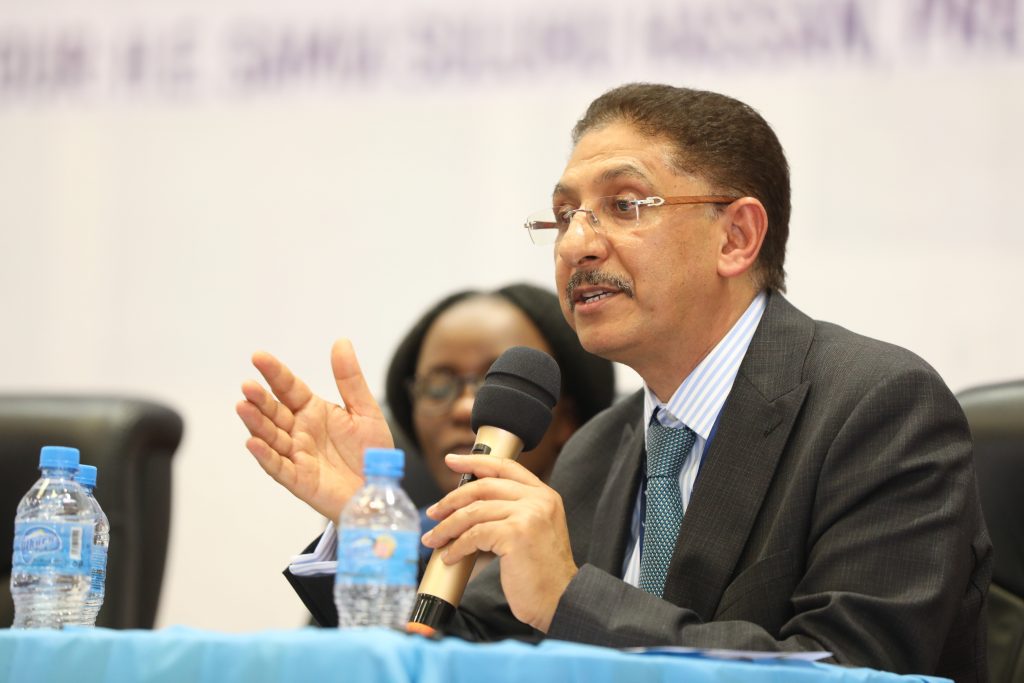
By Jaston Binala Recently in Dodoma.
Distrust of the private sector is high among bankers in Tanzania it emerged during the recent Conference of Financial Institutions in Dodoma–a factor contributing to slow down of credit growth to the private sector.
The Conference of Financial Institutions in November 2021 was jointly organized by the Bank of Tanzania (BoT) and the Tanzania Bankers Association (TBA). And bankers spoke their mind here.
In his welcome address, the Bank of Tanzania Governor, Prof. Florens Luoga, described the banking sector in the country as “stable, profitable, and adequately capitalized”, but he admitted credit growth to the private sector was slow.
He said the banking sector’s Core Capital and Total Capital stood at 17.1% and 17.9% at the end of June 2021, compared with regulatory requirements of 10 percent and 12 percent, respectively. The ratio of liquid assets to demand liabilities was 33.3% in 2020/21, above the minimum regulatory requirement of 20%, implying that banks had adequate liquidity for lending to the private sector.
Chairman of the Tanzania Bankers Association (TBA), Abdulmajid Nsekela, agreed banks have remained resilient but the sector was riddled with cases of unpaid loans totaling to a staggering Tsh. 1.2 trillion/-. Nsekela is also CRDB Bank Managing Director.

Prof Luoga said growth of credit to the private sector had in financial year 2020/21 slowed to 4.3%, compared with 8.1% in financial year 2019/20 as demand for new loans declined amid elevated credit risk of borrowers.
He said non-performing loans (NPLs) had declined to 9.3 percent in June 2021, down from 10.8 percent in the corresponding period in 2020, but this level was still above the acceptable level of 5 percent.
Tanzania President Samia Suluhu Hassan had earlier in the year advised the Central bank to reduce interest rates to encourage credit growth to the private sector; action was taken by the central bank to heed the counsel and TBA has promised to cut rates, but it turns out interest rates may not be the only factor slowing down credit to the private sector. There is a can of worms in the private sector.

Addressing the recent 20th Conference of Financial Institutions at Jakaya Kikwete Conference Centre in Dodoma, the President said “I have also discovered that growth of the private sector is not well, especially because not very much credit is going to the private sector.”
She then added: This year when I was opening the Bank of Tanzania branch in Mwanza I touched on the issue of interest rates; I asked the Bank of Tanzania to reduce interest rates so that the private sector is able to borrow…I am glad today, to hear that the Bank of Tanzania has already done so.”
The President also expressed concern that banks had concentrated investments in risk-free Government securities at the peril of loans to the private sector.
“I have been curious about the performance of the Governent securities market,” she said. “The summery of auction results reveals substantial and increasing subscription in three government securities–there is oversubscription in three risk-free government securities; and I am informed that major players are financial institutions.
“Indeed there is nothing wrong with financial institutions participating in financing of the Government budget, but the oversubscription is a signal that financial institutions do have significant liquidity and the Governor said it here.
“This liquidity can be directed to lend to the private sector. However, this is not happening as desired. As a result the level of credit to the private sector in Tanzania continues to be low with an annual growth of 4.3%. This is not a healthy situation and I would request financial institutions to lend more to the private sector,” the President said.
In mid 2021, BoT implemented measures to lower the cost of funds, to increase liquidity in banks, to facilitate lending to agriculture, to encourage use of digital payment platforms.
The policy measures included lowering the statutory minimum reserve requirement from 7 percent to 6 percent in May 2021 and recently providing relief to banks that will extend loans to agriculture at interest rate not exceeding 10 percent; this measure encompassed introduction of a special loan amounting to TZS 1.0 trillion for banks and other financial institutions at 3 percent to extend loans to agriculture at an interest rate not exceeding 10 percent.
BoT Lowered the statutory minimum reserve requirement from 7 percent to 6 percent in May 2021, they increased the daily transaction limits to customers who use mobile money from TZS 3,000,000 to TZS 5,000,000 and their daily balance from TZS 5,000,000 to TZS 10,000,000. The Central bank also provided regulatory flexibility to banks and other financial institutions to undertake loan restructuring for activities affected by the pandemic as well as relaxation of agent banking eligibility criteria that required business experience of at least 18 months for applicants of agency banking business; now the applicants is only required to have a national IDs.
CAN OF WORMS
Bankers, Economists and other finance pundits agreed liquidity was not a problem here, which raised need to critically identify reasons which fuel the slow credit growth to the private sector.
While the common narrative to explain the slowdown of bank credit to the private sector in Tanzania has been the complaint that interest rates were prohibitively high, some bankers and financial pundits have laid part of the blame on the private sector, arguing that interest rates was not the only problem here. The other problem is that some borrowers in the private sector can not be trusted, which forces banks to invest their monies in a more trustworthy client—the Tanzania Government.
Prof. Marcellina Chijoriga of the University of Dar es Salaam Business School attended the conference. The lecturer in business and finance chaired the panel discussion titled “Scaling Up Private Sector Credit Beyond Covid 19 Pandemic: Role of Government, Financial Institutions and Private Sector.

Prof. Chijoriga remarked as panel chairperson at the beginning of the discussion: “These people [the banks] are liquid rich…but they are not giving enough money”, basing her assessment on the Governor’s welcome address. Her remarks raised the need to critically review main reasons fueling the slow credit growth to the private sector. Is prohibitively high interest rates the problem?
The banking sector in Tanzania operates in what can be described as a ‘free market environment’ where each bank is free to fix rates it believes will attract clients. Current rates range between 13% and 14% according to publicly available data. But the Central bank often creates conditions to encourage banks to lower their rates even as they operate in a free market environment.
In the words of the Central Bank Governor, the slow credit growth in 2020/21 was linked to subdued demand on one hand and elevated credit risk of borrowers on the other hand. The question of subdued demand may be linked to interest rates yes, but this suggestion may need further research.
A recurring opinion among experts at the conference was that the slow growth of credit to private sector in Tanzania was linked to bankers’ loss of trust to the private sector.
Dr. Muhsin Masoud, Executve Director of the People’s Bank of Zanzibar said banks were having a lot of difficulty trusting borrowers.
Lack of access to bank credit was not associated with interest rates, he said. The problem was lack of trust to clients because banks had experienced many cases in which clients had lied on their collateral.
“In some cases customers are not trustworthy,” Dr. Masoud said. “You can get collateral; if they default to repay the loan and when you attempt to reinforce the contract by selling the house, the wife goes to court and it can take between 10 to 15 years to recover the loan.”
Dispelling the suggestion interest rates were prohibitively high, the former University of Dar es Salaam Business School lecturer said the interest rates which some people complain about are the same rates which others use and repay without a problem and succeed in building their businesses.
“Experience shows those who fail to repay the cause is not the cost factor,” Dr. Masoud said. “The cause is business mismanagement–in some cases the cause maybe economic factors but not specifically the cost factor. We have seen those who managed finances well take loans and moved from micro, to SME until they become a corporation using bank loans to prosper.”
Seif Seifi, a businessman representing the company Superdol was in attendance at the conference. He agreed with Dr. Masoud: “To get help from banks you need to build trust,” he said. “Pay [your loan] on time. With trust you can grow and become bigger.”

Speaking outside the conference hall during a tea break, the renowned Tanzanian economist Prof. Samuel Wangwe told TZ Business News there is a serious problem in the Tanzania private sector when it comes to dealing with bank loans:
“Business people borrow money for one thing but will use that money for something else,” Prof. Wangwe said. “Use the money for the purpose intended.”

Ruth Zaipuna, Chief Executive Officer of the Tanzania Microfinance Bank (NMB) played the role of main speaker during the panel to discuss “Scaling Up Private Sector Credit Beyond Covid 19 Pandemic: Role of Government, Financial Institutions and Private Sector”.
Zaipuna asked banks to have an empathetic sensitivity toward the country’s private sector on the understanding that this sector faces many challenges which include ‘governance issues’(internal organizational problems) and lack of basic structures. They also have issues concerning succession plans.

“I think we just need to find ways to support them,” Zaipuna told the conference. “We also need to continue to widen financial inclusion; only 20% of Tanzanians hold bank accounts. This is too small. There is still need to bring people into the sector before you start thinking about extending credit to them.”
Need exists to maintain collaboration between financial institutions, private sector and the government to ensure sustainable growth of the economy, she said.



